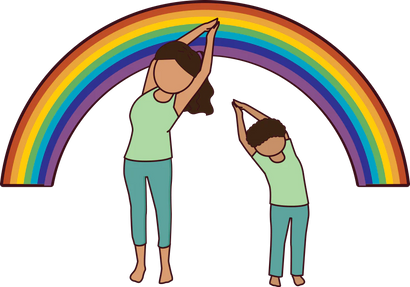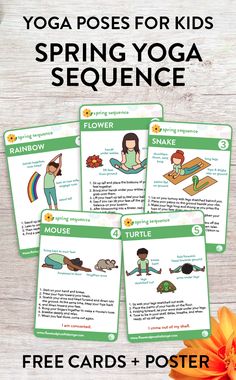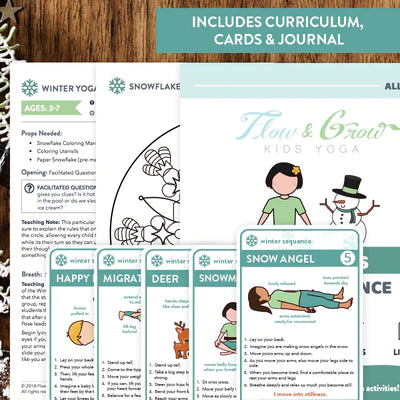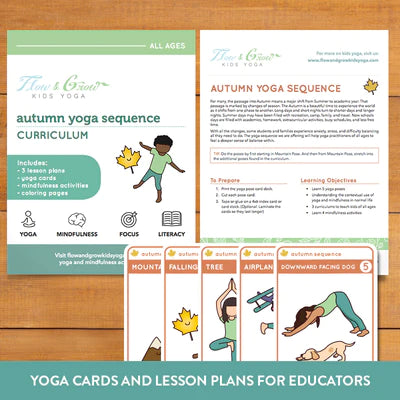Your Cart is Empty
22% off Automatically at checkout when you spend $5 of more!
22% off Automatically at checkout when you spend $5 of more!
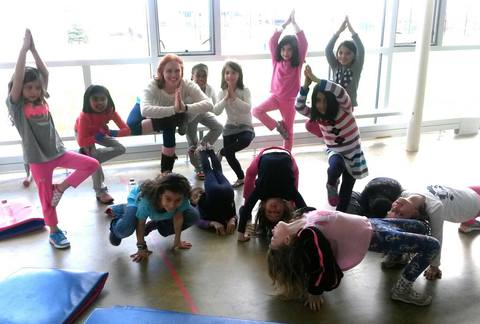
Yoga and Mindfulness for Challenging Behaviors Part 2 -- Anxiousness and Catastrophizing
by Lara Hocheiser October 14, 2021 4 min read
By Kathryn Boland, Flow and Grow Kids Yoga Blog Manager and 95-hour Teacher Training Graduate and Lara Hocheiser, Flow and Grow Kids Yoga Founder/Owner
Kids acting in ways that make you a little nuts, however understandable through these times? Hoping for some positive changes? What would it be like to have your kids or students a bit steadier? Yoga and mindfulness is no cure-all (and severely problematic behavior might very well call for the assistance of a psychological professional) -- yet it’s a holistic approach that can make a difference when other approaches haven’t.

In this edition of this series, we’ll look at how accessible yoga philosophy concepts can help kids find more calm and contentment and less anxiety and catastrophizing. We'll preface with an important guideline: it's important not to shame children for experiencing anxiety or other challenging emotions. We must help them to understand that all emotions aren’t simply "good" or "bad", but rather more or less pleasant to experience and helpful within one's daily life ("good" and "bad" is just too simplistic).
We can validate hard thoughts and feelings while also giving young people the tools to get to somewhere better. Remember that at no time in your life has being told to “calm down” actually helped you to calm down. So we can acknowledge difficult thoughts and feelings and work through them, together!
Gratitude
In the wellness and holistic mental health worlds, gratitude has become quite a popular approach. That's because it's simple, accessible, and effective! In a basic sense, coming back to gratitude works almost like scratching an itch -- it can replace negative thoughts and feelings with something positive, even if momentarily, because our systems can only feel and perceive so much at once.
On a deeper, longer-term level, gratitude practice can show us that even in the hardest times, there are things that we can appreciate about the present moment -- even if that's as simple as breathing in and out and feeling life in your body. Some tips for fostering gratitude in young people:
- Model it: Vocalize being grateful for good food, nice experiences, things you like doing, anything at all you might be grateful for. Let that gratitude shine through how you act and interact each day. Our children watch what we do and hear what we say!
- Encourage it: Encourage young ones to say thank you for nice things or actions, or even to note their appreciation for good things and experiences in their lives. That can make gratitude a more natural response when anxiety might arise.
- Redirect to it: This requires true tact and care, because -- as noted -- it's important to not invalidate a young person's experience. When one may be having a hard time with anxiety or catastrophizing, acknowledge and validate how they're feeling. Thenshow rather than tell them that they still have things to be grateful for -- whether that be a favorite healthy treat, a favorite activity, or time with a good friend. Modeling and encouragement of gratitude (again, without invalidating how they feel) could come in at that point as well.
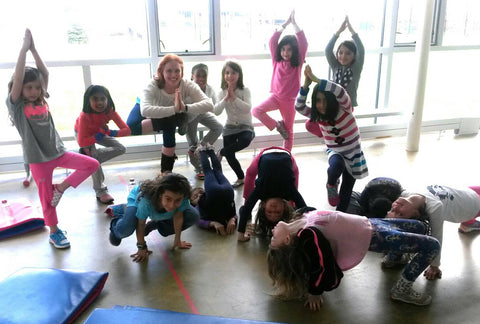
Acceptance and Satya
Acceptance is key in yoga philosophy. It doesn't mean that one has to like what's happening (or has happened or will happen), it just means that one accepts and integrates the reality they are experiencing. Allowing helps adults and children be with what is happening right now rather than resist. Resistance takes a lot of our energy and often doesn’t change a thing!
The Serenity Prayer: “God grant me the serenity to accept the things I can not change, courage to change the things I can, and wisdom to know the difference.”
As this prayer reminds us, if we can't change it, though it might be natural to be upset, it's not necessarily helpful. We could be spending that mental and emotional energy elsewhere in a positive way. That is wheresatya, or the yogic concept of truthfulness comes in; what is the truth of the situation? What does one know or not know? What can one change and what's beyond one's control?
If a child is upset about something like the way a sports game or a big test went for them, and anxious/catastrophizing about any consequences from that, you could use acceptance to help them shift their mindset. First, validate what they're feeling and assure them that you're there to support them.
Then remind them of a couple of important things. First, that we can learn from what already happened but we can't change it. Take time to feel what you need to feel, but then it's time to look forwards to what's next doing one's best then. Second, to help bring down catastrophizing in particular, what they might be dreading might not come to pass -- they don'tknow that it will. Better to spend that energy on anything they can do to improve the situation (such as studying hard and/or working with a tutor to bring up one's grade, getting adequate rest, sleep, exercise, etc).
Just as with gratitude, we can model acceptance and looking at situations truthfully, encourage young people to do the same in calmer, more joyful moments (so they have those tools ready for harder times), and redirect to acceptance and truthfulness (as described above, making sure to first acknowledge and validate the feeling and then offer support). These approaches can be in your toolbox as a parent and/or educator to help take the edge of anxiety for the young people in your life.

Interested in learning more about how to raise or educate happier and more well-behaved kids through yoga and mindfulness? Stay tuned for the third and last edition of this blog post series! If you want to go even deeper, check out ourYamas and Niyamas bundle,
Questions? Email the creator of these resources, Flow and Grow Kids Yoga Founder/Owner Lara Hocheiser atlara@flowandgrowkidsyoga.com.We always love hearing from people in our community!Leave a comment
Comments will be approved before showing up.
Also in Kids Yoga Blog
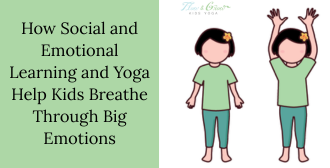
How Social and Emotional Learning and Yoga Help Kids Breathe Through Big Emotions
by Kane SEO April 21, 2025 4 min read
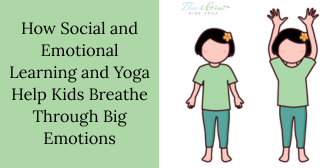
How Social and Emotional Learning and Yoga Help Kids Breathe Through Big Emotions
by Kane SEO April 14, 2025 4 min read
In classrooms and communities around the world, educators and parents alike are placing a growing emphasis onsocial and emotional learning. And for good reason: helping children understand, manage, and express their emotions in healthy ways is just as critical as teaching them to read or do math.

Power of Yoga for Kids: How It Helps Them Grow, Focus, and Thrive
by Kane SEO March 25, 2025 5 min read
In today’s fast-paced world, children are often exposed to stressors from a young age, whether it’s academic pressure, social challenges, or the overwhelming influence of digital devices. This can impact their physical, mental, and emotional well-being.
Kid’s Sun Salutation Yoga Cards
digital-resourcesearly-childhood-yoga-mindfulnesselementary-yoga-mindfulnesskids-yoga-resourcesliteracyunder-15yoga-cards
Kid’s Sun Salutation Yoga Cards
3 reviews
4.33 / 5.0
(3) 3 total reviews
$10.00
Kid’s Sun Salutation Yoga Cards
3 reviews
4.33 / 5.0
(3) 3 total reviews
$10.00
Ultimate Kids Year of Yoga Bundle
bundlespricey-contentdigital-resourcesearly-childhood-yoga-mindfulnesselementary-yoga-mindfulnesskids-yoga-resourcesmiddle-high-school-yoga-mindfulnessseasonal-yogayoga-cards
Ultimate Kids Year of Yoga Bundle
5 reviews
5.0 / 5.0
(5) 5 total reviews
$45.00
Ultimate Kids Year of Yoga Bundle
5 reviews
5.0 / 5.0
(5) 5 total reviews
$45.00
Yamas and Niyamas: Successful Relationships with Self & Others (tweens and teens)
pricey-contentdigital-resourceskids-yoga-resourceslesson-plansmiddle-high-school-yoga-mindfulnessmindfulness
Yamas and Niyamas: Successful Relationships with Self & Others (tweens and teens)
2 reviews
5.0 / 5.0
(2) 2 total reviews
$49.00$55.00
Yamas and Niyamas: Successful Relationships with Self & Others (tweens and teens)
2 reviews
5.0 / 5.0
(2) 2 total reviews
$49.00$55.00
